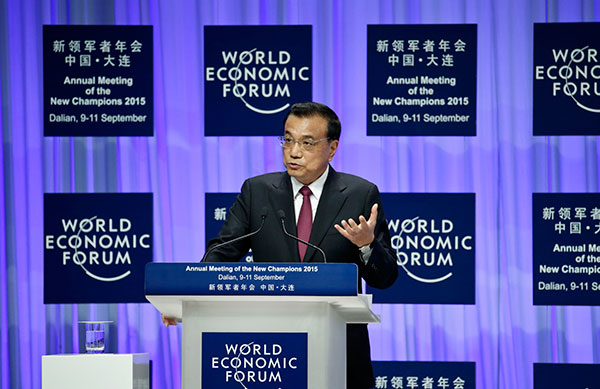Nation continues to drive global economic growth
Updated: 2015-09-11 07:41
(China Daily)
|
||||||||
 |
|
Premier Li Keqiang delivers a speech at the opening ceremony of 2015 Summer Davos forum in Dalian, Liaoning province, on Sept 10, 2015. [Feng Yongbin/ China Daily] |
There is no shortage of seemingly downbeat news about the world's second-largest economy nowadays, which has stoked up global investors' concerns about the overall health of the Chinese economy, a major driving force for global growth.
This week alone, a rare downward revision of China's GDP growth rate for the previous year and a record monthly reduction in China's foreign exchange reserves last month was followed by a 13.8-percent year-on-year drop in the gross value of imports for August. This was the 10th consecutive month of declining imports, highlighting both lower global commodity prices and sluggish demand.
However, these numbers do not automatically provide a complete picture of the Chinese economy as it undergoes structural reforms and adjustments.
Hence, Premier Li Keqiang's latest promise that the country will stick to its course in pursuit of sustainable growth is a reassuring message.
To help global investors put the piecemeal information in perspective, Li went to great lengths at the Summer Davos in Dalian, Northeast China's Liaoning province, to explain that "as the traditional growth drivers get replaced by new ones, it is only natural to see fluctuations in some of the economic indicators on a monthly or quarterly basis."
More important, he assured his listeners that "we will not be swayed by short-term fluctuations in certain economic indicators, but we will not take them lightly either."
Thanks to the Chinese government's strong support for entrepreneurship and innovation, over 10,000 new market entities on average have been registered on a daily basis since last year. Other structural reforms to improve the quality of growth have resulted in such encouraging changes that consumption is contributing about 60 percent to China's economic growth while the service sector now accounts for almost 50 percent of GDP. More than 7 million urban jobs were created in the first half of this year.
Yet these positive structural changes do not mean Chinese policymakers will rest on their laurels and ignore the financial and economic difficulties the country is facing, some of which could even trigger systemic risks if not handled correctly.
Instead, they indicate the right direction for China's economy. As long as the country continues to deliver on its long-term agenda for economic reforms and development, the world economy can expect China to emerge as a more sustainable, equitable and longer-term driver of global growth.
- Hohhot overseas student pioneer park, core of 'Grassland Silicon Valley'
- Tight pollution controls affect major industries
- Tianjin announces pensions for martyred firefighters' families
- TCM tonic herb 'can kill HIV', study finds
- Intl Helicopter Exposition kicks off in Tianjin
- Premier Li commends nation's teachers
- Russian military experts present in Syria
- Norway PM says Norwegian citizen taken hostage in Syria
- Hungarian TV journalist fired for tripping up fleeing migrants
- Leaders from EU, Russia, Ukraine to meet in Paris in Oct
- Music is food for the soul for young Chinese violinist
- Australia's Tasmania, China agree to 'work together' on Antarctic expeditions

 Greedy panda eats ten boxes of honey
Greedy panda eats ten boxes of honey
 Soldiers in Sansha guard the islands
Soldiers in Sansha guard the islands
 Dunhuang heritage still alive in new age
Dunhuang heritage still alive in new age
 Bigger iPad announced at Apple 'monster' event
Bigger iPad announced at Apple 'monster' event
 World's largest mural on a giant rooftop
World's largest mural on a giant rooftop
 Starry Night: Van Gogh in Beijing
Starry Night: Van Gogh in Beijing
 Dog rescue leads to self-stabbing
Dog rescue leads to self-stabbing
 Serena vs Venus: Sibling rivalry as usual
Serena vs Venus: Sibling rivalry as usual
Most Viewed
Editor's Picks

|

|

|

|

|

|
Today's Top News
New iPhones unveiled
Inside look at Apple's newly-launched products
Peking Opera performance thrills NY
Chinese man, daughter arrested in alleged marriage scam
China's CPI up 2% in August
Hillary Clinton's lead eroded by Joe Biden's surge in poll
Apple TV comes with 'apps'; big iPad aimed at business
China aims to be first to land on far side of moon
US Weekly

|

|








